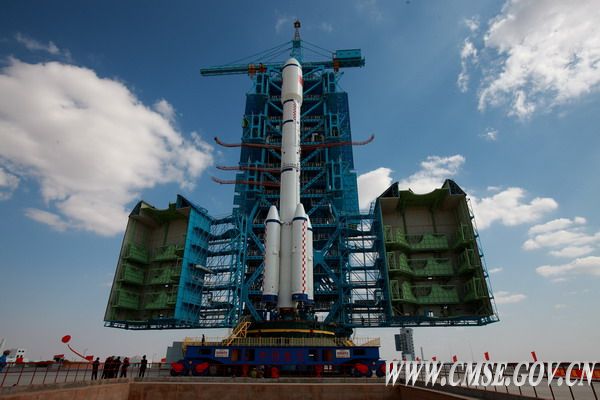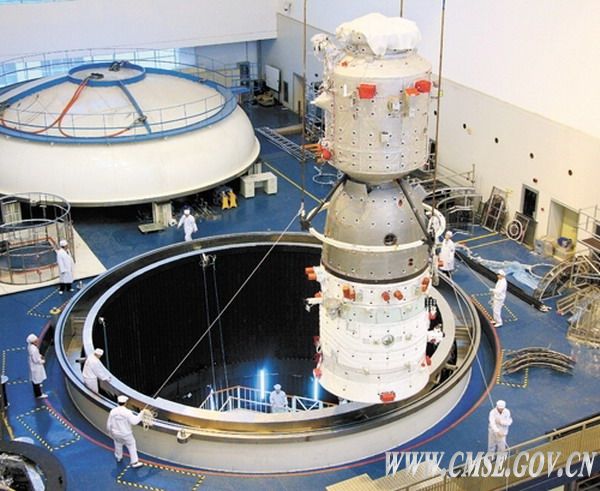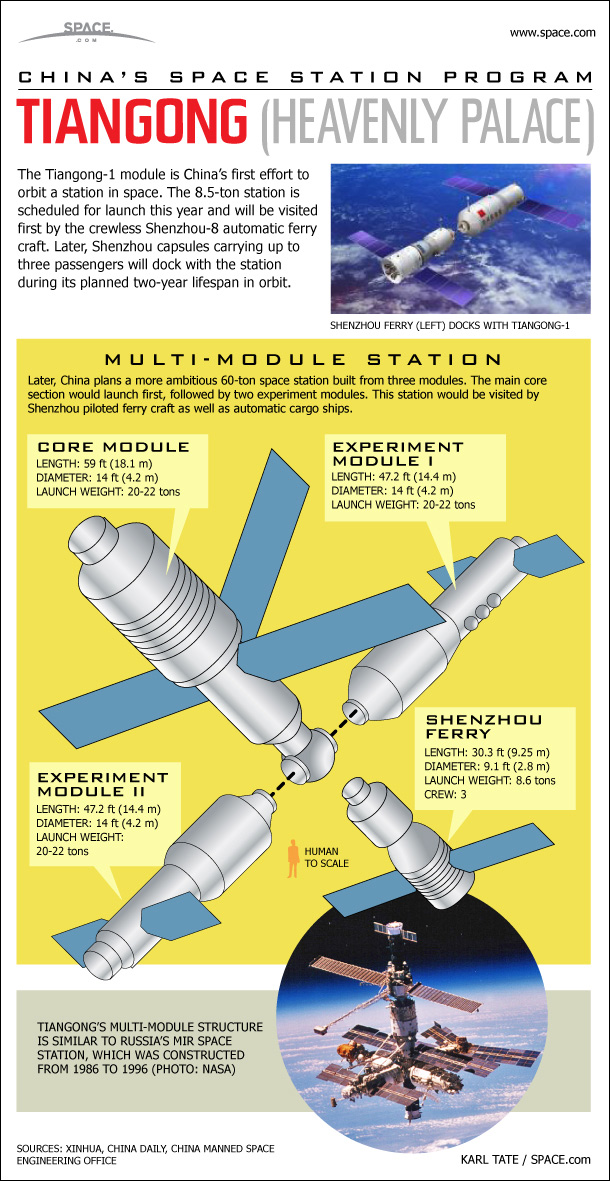China to Launch 1st Space Lab Module on Thursday

China is set to launch its first space laboratory into orbit Thursday (Sept. 29), provided the weather cooperates for the planned liftoff.
China's Tiangong 1 space lab is slated to launch aboard a Chinese Long March 2F rocket from the Jiuquan Satellite Launch Center in Northwest China. The prototype, which will test docking technology with the country's Shenzhou spacecraft, is an important step toward China's goal of constructing a crewed space station in orbit.
Tiangong 1, whose name means "Heavenly Palace" in Chinese, is 9.4 tons, with a length of 34 feet (10.4 meters) and a width of 11 feet (3.35 meters). The unmanned Tiangong 1 module was originally scheduled to blast into orbit between Sept. 27 and 30, but cold weather forced controllers to postpone the targeted launch date, according to state media reports. [Photos: China's First Space Station]
Liftoff is set for between 9:16 p.m. and 9:31 p.m. Local Time at the launch site (Thursday morning in the United States), according to state media reports.

China's space launch rally
China is expected to launch three additional spacecraft at a later time to connect with Tiangong 1 in space. The unmanned Shenzhou 8, Shenzhou 9 and Shenzhou 10 spacecraft are designed to robotically attach to the Tiangong 1 module in what will be the country's first dockings in orbit.
"It’s a big deal at several levels," said Dean Cheng, a research fellow on Chinese political and security affairs at the Heritage Foundation, a conservative public policy think tank. "If all goes according to plan this will be China's initial effort at docking, and of course docking is one of those sin qua nons for more prolonged exploration of space. They have to get this skill set down."
Get the Space.com Newsletter
Breaking space news, the latest updates on rocket launches, skywatching events and more!
China had originally planned to launch the space lab module earlier, but last month, a Long March 2C rocket, which is similar to Tiangong 1's Long March 2F booster, malfunctioned shortly after liftoff and failed to reach orbit. Chinese officials temporarily halted plans for Tiangong 1 as they investigated the accident, which resulted in the loss of an experimental satellite.

China's growing space program
The launch of China's first space lab test module is considered an important milestone for the country and its growing space program. Chinese officials have voiced their intent to build a 60-ton manned space station by the year 2020. [Infographic: How China's First Space Station Will Work]
In addition to acting as an important test bed for these space station aspirations, Tiangong 1 will also carry medical and engineering experiments into space.
The module is expected to remain in orbit for two years, reported state news agency Xinhua.
China is only the third nation to independently launch humans into orbit, after the United States and Russia. The nation's first manned mission, Shenzhou 5, was piloted by Yang Liwei on Oct. 15, 2003. Liwei's 21-hour mission was followed by two more manned missions in 2005 and 2008.
You can follow SPACE.com staff writer Denise Chow on Twitter @denisechow. SPACE.com senior writer Clara Moskowitz contributed to this report. Follow SPACE.com for the latest in space science and exploration news on Twitter @Spacedotcom and on Facebook.
Join our Space Forums to keep talking space on the latest missions, night sky and more! And if you have a news tip, correction or comment, let us know at: community@space.com.

Denise Chow is a former Space.com staff writer who then worked as assistant managing editor at Live Science before moving to NBC News as a science reporter, where she focuses on general science and climate change. She spent two years with Space.com, writing about rocket launches and covering NASA's final three space shuttle missions, before joining the Live Science team in 2013. A Canadian transplant, Denise has a bachelor's degree from the University of Toronto, and a master's degree in journalism from New York University. At NBC News, Denise covers general science and climate change.









